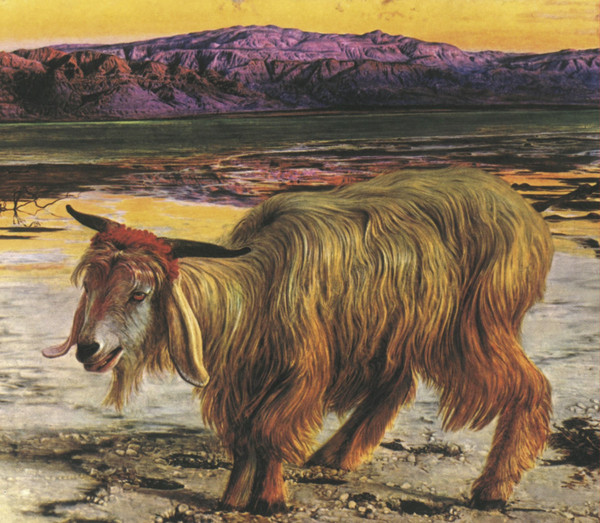 |
| Detail from Botticelli's Venus and Mars: is the satyr grasping datura stramonium? |
Sex, Drugs & Magick Chapter Two: Horned Gods and Horny Potions
I think my title for this week is much more accurate than the actual title of the chapter; everything I've read about solanaceous drugs comes to the same conclusion- they're not worth the hassle. (I guess it could be argued that the factitious works of Castaneda portray jimson weed in a positive light in the first couple books, though I'd argue that the tone of those works is still cautionary and highly, if perhaps falsely, contextualized.) Wilson later wrote : "[t]he four weirdest and scariest drug stories I know all involve belladonna, a chemical for which I now have the same sincere respect as I have for hungry tigers, earthquakes, floods, wildfires, the IRS and Dr. Hannibal Lecter." In his short essay "La Belle Dame Sans Merci," that introduction is followed by a harrowing account of a very unpleasant trip though separate realities that Wilson experienced while living in Yellow Springs with Arlen (who briefly, through Wilson's solanaceous lenses turned into a vampire).
In Jim DeKorne's excellent Psychedelic Shamanism the solanaceous drugs are discussed as "belladonna alkaloids" and he focuses mostly on the use of different strains of datura grown in North America, colloquially referred to as jimson weed or thorn apple. DeKorne attributes the popularity (?) of experimentation with belladonna alkaloids to the aforementioned works of Carlos Castaneda and makes some fascinating observations about the usage of this family of drugs. To DeKorne, datura is a distinctly feminine drug, something that can be backed up by Don Juan's imaginary expertise, and is known for its dangerous twists and turns; he equates datura, quite poetically, with the femme fatale stereotype. DeKorne notes that trips utilizing belladonna alkaloids often are bad trips in the context of male, Western users but serve a beneficial, or at least non-traumatizing, purpose for female and indigenous users throughout history. DeKorne also brings up the modern hypothesis that the broomstick is associated with witchcraft because medieval witches perhaps applied their "flying ointment" to their genitals using broom handles as the applicator/dildo. I would imagine that this idea would not have been in the milieu at the time Wilson wrote Sex, Drugs & Magick, or he surely would have included it in this tome.
Whatever the case, DeKorne concludes that with other, less dangerous and more predictable doorways to eternity available, it is best to avoid consuming belladonna alkaloids. He does recommend growing datura, which when I read the book I took to heart and for one summer/autumn I had two large datura plants, they grow quickly, in my apartment's backyard. I only had one a handful of blossoms appear, the blossoms are quite beautiful and give datura another one of its names: "angel's trumpet." I also found the plants to be distinctly feminine, probably because of DeKorne's impressions on me and their association with witchcraft. I cannot say that I ever tried datura or any other derivative from this family, my wiser teachers got to me early and by the time I read Castaneda, I knew to take everything with a grain of salt.
Historically, there's a lot to talk about concerning the solanaceous drugs, but practically it seems like there is very little use for them. (I do raise my eyebrow at the suggestion that Euripides' maenads are obviously under the influence of solanaceous drugs.) Perhaps it is best to view this family of drugs as the exclusive purview of indigenous populations who have retained a contextual practice for utilizing them and as an art that has been lost in our Western culture, burned away with what few practitioners may or may not have been persecuted during the days of witch hunts. All reconstructed recipes of "flying ointment" I have ever seen come with strict warnings that these are conjectural and for intellectual purposes only.
Stray Thoughts
- The Book of Shadows that Wilson references certainly isn't centuries old; Wicca was made up whole cloth by Gerald Gardner in the mid-twentieth century. (Wilson does include Francis King's similar assessment.) While this doesn't delegitimize the religion, the constant aping at an obviously made-up sense of posterity is embarrassing. Like most things in modern magic, the elements of Wicca can be traced back to Aleister Crowley. Crowley, in his old age, had some remaining fans/disciples/hanger-ons including Gerald Yorke, Kenneth Grant and Gerald Gardner. Crowley was the co-author of the three Degree rites of Gardnerian Wicca or Gardner was heavily influenced by Crowley's writing when he authored the rites himself. This Crowleyean influence would diminish as Gardner's Wicca philosophy matured.
- In his essay "Magic, Running Through the Gutters Like Lightning," Alan Moore references the idea of flying ointment and the broomstick applicator and advises the reader: "best not to think of the Quidditch changing rooms in Harry Potter." Speaking of Harry Potter, I wonder what Wilson, who predicted that Dr. Strangelove may contain the last major reference to mandrakes, would think of today's world where plush and animatronic mandrakes are available in bookstores because of The Boy Who Was Worth Millions.
- "La Belle Dame Sans Merci" was published in email to the Universe, available from Hilaritas Press!
- Here is an article that discusses the Botticelli painting that serves as the illustration for this week. The article describes datura as "poor man's acid" and have an effect that is "half alcohol and half opium," I would say our other sources disagree.
- I read John Dickson Carr's The Crooked Hinge some years ago on Wilson's recommendation in this chapter. I remember being slightly disappointed by what I perceived as too little drugged witchcraft but the denouement is as interesting as our author suggests. It also involves the Titanic!


